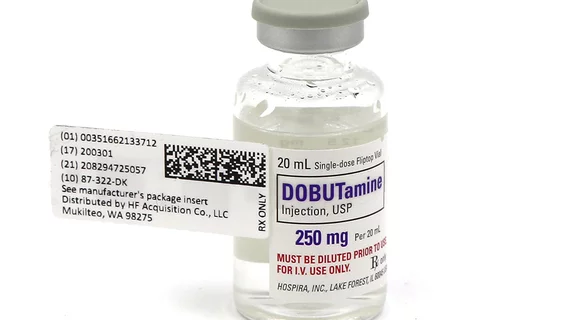A new supply issue hits cardiology: 5 recommendations for cardiologists during the dobutamine shortage
Healthcare providers still recovering from this year’s iodine contrast shortage now have another shortage to deal with—and it is one that could have a significant impact on cardiologists in the months ahead.
This latest shortage involves dobutamine, an injectable medication often prescribed for advanced heart failure and cardiogenic shock. It is also a central component of dobutamine stress echocardiography (DSE), a test used to evaluate patients with severe aortic stenosis. While dobutamine levels are expected to return to normal by the end of 2022, or early 2023 at the latest, this still leaves heart teams with some key hurdles to clear.
The American College of Cardiology (ACC) has shared a new breakdown of the shortage to help any clinicians who may be struggling at this time. Representatives from the ACC’s Heart Failure and Transplant Member Section, its Cardiovascular Team Section and University of Utah Health all contributed to the document.
These are five recommendations taken from the group’s analysis:
1. Use alternatives—catecholamine or non-catecholamine—when possible, especially when prescribing medications to post-operative patients who appear to be on the road to recovery.
If anything, the specialists explained, this shortage provides “an opportunity to reassess the need for the routine use of vasoactive agents.”
“Besides, there are several other agents that can be used,” they added.
2. For patients presenting with advanced heart failure and cardiogenic shock, consider milrinone as an alternative. This also applies to post-operative patients presenting with low left ventricular ejection fraction.
“For the care of patients with low-output HF, the dobutamine shortage creates a very serious problem,” according to the analysis. “All measures must be taken to provide an uninterrupted supply of dobutamine and milrinone.”
3. In cases when DSE would normally be considered to evaluate ischemia, use alternatives such as adenosine nuclear stress tests or stress cardiac MRI examinations.
4. In cases when DSE would normally be considered to evaluate myocardial viability, use alternatives such as MRI, PET or SPECT examinations.
5. Try to save dobutamine for cases when low-dose DSE is necessary.
“It must be noted that there is no alternative to the use of dobutamine for grading the severity of low-flow aortic stenosis,” according to the analysis. “Fortunately, this is a narrow area, and in most cases the test can be postponed by weeks or even months.”
The ACC document offers a wealth of additional information for cardiologists and other healthcare providers responsible for the care of heart patients. Multiple clinical scenarios are provided, for example, helping demonstrate the types of scenarios physicians might find themselves in as this shortage continues. Read the full analysis here.
FDA says dobutamine shortages could last into February 2023
The FDA Drug Shortage resource webpage states the shortage of dobutamine hydrochloride injection is due to Baxter Healthcare and Hospira Inc. reporting increased demand amid limited supply. Hospira also reported earlier this summer to the FDA that the drug production was discontinued, but says it now hopes to have supplies back to normal levels by February 2023. Baxter reported to the FDA it hopes to have its supply shortage fixed by the end of August.

